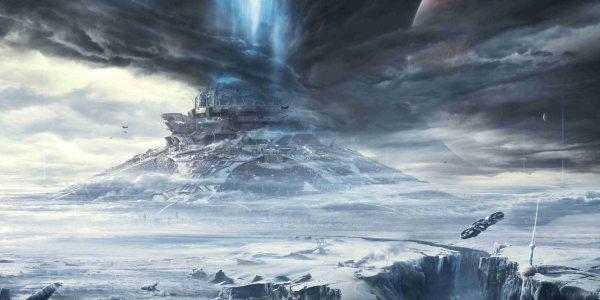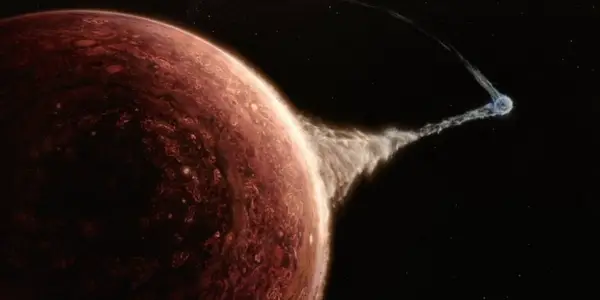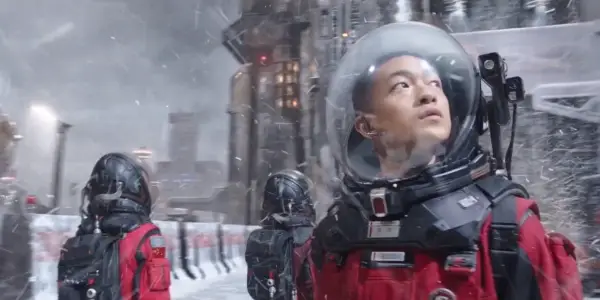THE WANDERING EARTH 流浪地球: One Giant Leap for Chinese Cinema

Kevin L. Lee is an Asian-American critic, producer, screenwriter and…
After hearing that Netflix has purchased the distributing rights of The Wandering Earth 流浪地球, I would not be surprised that the later months would see mixed to negative comments on social networks everywhere. I suspect many Western moviegoers would just shrug this off, and I can’t exactly blame them when they eventually voice their disapproval.
But context is everything. To me, context and background greatly shaped how I approached this film. All the problems I had involved clichés and set pieces that we have all seen before in many Hollywood blockbusters of this genre. It’s a pattern you can find in major Chinese films – they often borrow from Hollywood. That being said, The Wandering Earth being a Chinese film is exactly why I had a great time with it. The fact that China pulled this off without any support from Hollywood is an achievement in itself.
What a Committed Premise!
The premise of The Wandering Earth is probably the greatest litmus test in any film I’ve ever seen since Abraham Lincoln: Vampire Hunter… that is you are either on board with its concept or not at all, and the answer to this question will heavily determine whether or not you enjoy the film.

This film is literally about human civilization coming together to develop a global project known as “The Wandering Earth.” The project is to migrate the planet Earth to the Alpha Centauri system in hopes of preserving humankind and avoiding the Earth’s inevitable destruction by the sun’s aging expansion. So yes, there are literally giant thrusters running on fusion power, built across half of the entire planet in order to propel Earth in space. There are even bigger engines built to stop the Earth’s rotation, and in preparation of the global catastrophes that will arise, the project built underground cities to accommodate for the surviving human population. Yes, Planet Earth is now a giant spaceship that, when seen in space, looks like a comet traveling away from the solar system.
Again, you’d either think this is the stupidest concept you’ve ever heard, or you’d just go along with it and secretly admit this is the coolest idea ever and anyone who thinks otherwise is just a boring cynic who can’t have some imagination and fun. I am proud to report that I’m part of the latter group.
There’s a sense of lore and history throughout The Wandering Earth. In fact, one of the tiniest details I appreciated about the film was the font of its title and text – traditional paintbrush handwriting overlaid on a futuristic sci-fi story. As ridiculous as the premise may be, the film grounds it into reality through small details. As the film begins, the Earth has already left its placement in the solar system, away from the sun. The weather has become an unbearably cold wasteland of -83 degrees Celsius, and only 3.5 billion people remain in the underground cities. Despite all the futuristic gadgets shown in the film, they all have a sense of being used for a long time. It’s the kind of premise you’d normally find in anime series that creates a lot of room to play with history, character, stakes, and rules. That, to me, is where things can get really fun in a movie.
So Much Borrowing and Procedural Writing
Let me get the worst stuff out of the way first. The Wandering Earth borrows from a ton of Hollywood sci-fi epics. Some scenes even come off as direct rip-offs. From start to finish, you will notice plot points from Interstellar, Gravity, 2001: A Space Odyssey, Armageddon, and every Roland Emmerich disaster movie ever.

Did they bug me? Of course they did. Yet, none of it surprised me. Chinese films have a history of borrowing from Hollywood, because guess what? The Chinese film industry *looks up* to Hollywood. The world outside the American film industry has always been playing catch-up on technique, execution, and style. It is no surprise to me that this film has several set pieces borrowed from other films. What IS a surprise to me is director Frant Gwo 郭帆 and his team of writers understand what made each of those Hollywood plot points good and meaningful. They’re not borrowing for the sake of borrowing. The filmmakers managed to string everything together and make them appropriately serve the plot. Even if a plot point comes from Interstellar, I can still praise it if the film makes the effort to earn those emotions.
That doesn’t take away the surface-level problems in the script, though. In addition to moments of unintentional comedy (one of them is in the trailer), the script doesn’t give much room for the characters to grow and become three-dimensional. Quite a few members in the cast are written as archetypes, from the comic relief guy (who’s never that funny) to the science nerd to the rugged squad leader. The characters are often written into a scene because the scene naturally calls for that kind of character to be present to give that line that is needed at the moment. Anything else outside of that is kind of barren, like the icy surface of the Earth.
What a Heart!
Having seen Wu Jing less than a year ago in the financially successful Wolf Warrior 2, a part of me could not help but feel he was underused here. The man is best known for his martial arts and action choreography, and we get none of that here. That being said, based on what was given in the script, Jing delivered quite a performance. He captures the emotional conflict for a man caught in between being a father and being an astronaut serving the greater good of human civilization. The responsibilities between personal and global all rest on his shoulders. The same can be said for Qu Chuxiao, who gives an expressive, dynamic performance for a 24-year old actor in his first blockbuster lead role.

There are plenty more scenes where The Wandering Earth goes for the typical Asian sentimentality. You have the tearful goodbyes and the rousing speeches, all unapologetically delivered. My American side laughed over how on-the-nose the emotion can be. My inner Asian, on the other hand, was applauding and rooting for anything motivational to happen. The entire planet is coming to an end! Hope is a powerful force, and watching humanity come together in the face of great odds is moving in any situation, goddammit!
Insane Production Value and Visuals
The real takeaway from The Wandering Earth is just how good it looks for a Chinese movie. Remember when the South Korean movie Train to Busan looked better than World War Z did? This is exactly like that. You can pull any visual effect shot in this film, drop it into a Hollywood blockbuster, and you would think it’s your typical tent-pole $100 million budget movie.
The shocker is The Wandering Earth was made with $50 million, and from start to finish, the filmmakers never seemed to cut corners in the production design. If they did, then props to the filmmakers for being good at hiding them. The physical sets range from space stations to underground city streets to factory floors to lab rooms to the inside of a giant transport truck, all built with detail and imagination without exaggeration. The frozen wasteland never feels like an obvious green screen. The characters walk around with real mechanical suits that give Edge of Tomorrow vibes. Every single shot was put together with the intention of having its world feel as realistic and lived in as possible.

In my experience of watching several Asian action movies, their budgets have always forced the filmmakers to cut corners. The CGI normally looks like a PS2 video game. Characters will hold a bright CGI object that doesn’t even light up their own face. Fight scenes will remind you more of TV Power Rangers than they do Pacific Rim. Details like that always make Asian blockbusters a full tier behind Hollywood’s immersive quality. With The Wandering Earth, the gap between the two film industries has dramatically shrunk.
Interstellar was filmed on a budget of $165 million. Gravity was $100-130 million. Even Armageddon, a film that is over 20 years old now, costed $140 million to make. The fact that China pulled off a film on the scale of The Wandering Earth on a budget that’s one third the general budget of a Hollywood epic is a ridiculously impressive achievement.
One last thing: I want to give credit to Gwo for clearly proving that he took notes in how to edit a film that spans across multiple timelines and locations. The Wandering Earth not only adopts the insane production quality of a tent-pole blockbuster, but it also adopts the editing style of milestone filmmakers like Christopher Nolan and Peter Jackson. The way their films drown out sound effects in favor of a voice narration or musical score is perfectly replicated here, and I’m here to celebrate it.
The Wandering Earth: For Hollywood, Typical. For China, Revolutionary.
The Wandering Earth may seem like one small step in the eyes of Western moviegoers, but it is one giant leap for Chinese cinema. Make no mistake, this film can stand alongside any Hollywood blockbuster in terms of quality. It fully embraces its ridiculously creative premise with attention to detail, great performances, and visual flair from start to finish, while making a lot of room to tell more stories in the future. Yes, I’m down for a sequel.
While it borrows heavily from other Hollywood films, this is an example where every technique was appropriately adopted and executed properly. Of course, I understand the opposing argument. There will be people who still think The Wandering Earth is objectively not good, and the reasoning is undoubtedly justified. But when you zoom way out and look at the influential power and eventual legacy of this film, as an entry in the Chinese film industry, it’s a candidate for China’s Mount Rushmore. There’s a reason why three weeks into its theatrical release, The Wandering Earth is already the 2nd highest grossing film in China’s history – $650 million US dollars and growing. Meanwhile, even as a piece of sci-fi entertainment on its own, The Wandering Earth is a ridiculously fun time.
If this is a film you’re already looking forward to see, do yourself a favor and look for a theater that plays it before it’s out on Netflix. You’d want to watch this on the biggest screen possible.
Did you see The Wandering Earth? What did you think of the film? Share below!
The Wandering Earth was released in theaters in the US on February 6, 2019. For all international release dates, click here.
Does content like this matter to you?
Become a Member and support film journalism. Unlock access to all of Film Inquiry`s great articles. Join a community of like-minded readers who are passionate about cinema - get access to our private members Network, give back to independent filmmakers, and more.
Kevin L. Lee is an Asian-American critic, producer, screenwriter and director based in New York City. A champion of the creative process, Kevin has consulted, written, and produced several short films from development to principal photography to festival premiere. He has over 10 years of marketing and writing experience in film criticism and journalism, ranging from blockbusters to foreign indie films, and has developed a reputation of being “an omnivore of cinema.” He recently finished his MFA in film producing at Columbia University and is currently working in film and TV development for production companies.













